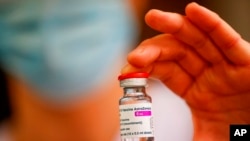Denmark health officials Thursday announced they were extending their suspension of the AstraZeneca COVID-19 vaccine for another three weeks to allow for more time for safety tests in connection to a fatal blood clot in a vaccine recipient.
The ruling comes as Europe’s drug regulator, the European Medicines Agency (EMA), and the World Health Organization (WHO) each pronounced the vaccine safe and effective.
Denmark suspended administering the vaccine March 11 after reports that a 60-year-old Danish woman died from blood clots after receiving the vaccine. Several other European nations followed suit.
At a news conference in Copenhagen, Tanja Lund Erichsen of the Danish Medicines Agency agreed with the decision.
"From a pharmacological perspective, the vaccine is still a safe and effective vaccine against COVID-19.” But it cannot be ruled out that there is a connection between the vaccine and a very rare form of blood clotting.
Both the EMA and WHO made similar comments last week but felt the benefits of the vaccine outweighed the risks. Danish Health Authority Director General Soeren Brostroem told reporters they may decide to end the suspension sooner, depending on the ''ongoing assessment.''
Denmark’s decision comes as AstraZeneca and the University of Oxford released updated information about its effectiveness. The new information, based on its late-stage clinical trial involving more than 30,000 participants in the United States, shows the two-dose regimen is 76% effective in preventing symptomatic coronavirus.
The latest release revises an announcement the British-Swedish company made Monday the vaccine was 79% effective against the virus. Those claims were questioned hours later by the U.S. National Institutes of Health (NIH) Data and Safety Monitoring Board that AstraZeneca “may have included outdated information” from the late-stage clinical trial, “which may have provided an incomplete view of the efficacy data.”
Along with the European countries, South Africa stopped using the AstraZeneca shot due to concerns about its efficacy against a local variant of the virus. The country sold at least a million of its AstraZeneca COVID-19 vaccines to the African Union.
Canada’s federal health agency announced Wednesday that it is updating the label on vials of the AstraZeneca vaccine with information about "very rare reports of blood clots,” but continued to stand by the vaccine’s safety and effectiveness against COVID-19.
The AstraZeneca vaccine has been the leading choice in the developing world because of its low cost and simple storage requirements.
The latest twist in the AstraZeneca vaccine saga comes as the United States and Brazil reach new milestones in the yearlong pandemic. According to Johns Hopkins University’s Coronavirus Resource Center, the U.S. has now surpassed 30 million total cases, the most of any nation, while Brazil has gone beyond the 300,000 fatality mark.
Denmark Extends AstraZeneca Suspension for Three Weeks
- By VOA News





